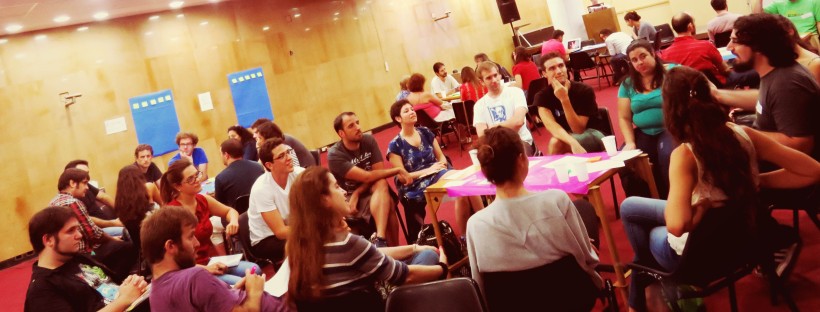Comunidad. Community. This word kept popping up in all of our interviews. But what does community really mean? What is the connection of communities to innovation?
Looking in the dictionary, one will find at least 10 different definitions to the word community. In the case of open government data, this definition might apply:
“The condition of sharing or having certain attitudes and interests in common.”
All of the people we spoke to have one common obvious interest: open data. However, during our research, we found that different stakeholders in this community usually also believe in social change, and see open government data as a tool, and not a mean, for that change. In all countries – Chile, Argentina and Uruguay – we found people who believe that they can make society better by contributing to it.
However, when it comes to Latin America, we can’t avoid the geographical context, which suggests that we apply another definition to the word community:
“a particular area or place considered together with its inhabitants.”
We found that as a continent, Latin America has a unique community spirit, with important wider implications. Firstly, there is a close network of individuals and organisations who cooperate with one another on a daily basis. For example, there is a Whatsapp group which connects different members of the community and has members from multiple Latin America countries.
Secondly, unlike other regions in the world, the Latin American open data community predominantly speaks one language, Spanish (with the major exception of Brazil). This helps to create a more comfortable environment for collaboration in a native language, allowing ideas to spread quickly.
Thirdly, there are also personal connections. Most of our interviewees mentioned that they see other members in the network not only as their colleagues, but also as their friends. The impression that came out of the interviews is that this network is supportive and allows different members of the network not only to share ideas, but also to try and implement them by providing mentorship and sometimes even financial support.

Buenos Aires Open Data community in ODD ’15
What makes this community so close? Our research points to one major initiative: AbreLATAM. AbreLATAM (a word play of the word abrelatas in Spanish, a can-opener in English), is the regional un-conference of open data practitioners in Latin America. The idea started in Uruguay, where the only local open data NGO, DATA Uruguay, decided that they needed a platform to share their experiences with other open data activists across the continent. Their idea was almost considered crazy at the time – to bring at least 100 people to Montevideo to discuss open government data. DATA Uruguay raised this matter with some funders, who were happy to give them a free hand to create the event, but also asked for an event that will involve governments. This led to the first regional open data conference that will be called Con Datos, that will follow this year’s AbreLATAM. AbreLATAM is now governed by a community of organizations, and was hosted for the second time in October 2014 in Mexico city by SocialTIC; Ciudadano Inteligente in Santiago will play host for the third edition in September
However, while discussing open data matters is important, interviewees from Chile, Argentina and Uruguay mentioned another aspect of AbreLATAM as their bonding time – parties. It is not surprising that “schmoozing” and sharing experiences outside of the main common interest help to create intimacy between participants and to bond together as a group. There is still no better connection than the face-to face-one.
Therefore, given this social emphasis, perhaps we should think about community in the sense offered by Rollo May, the famous American psychologist: “communication leads to community, that is, to understanding, intimacy and mutual valuing.” This leads us to think, can we replicate the AbreLATAM and the ‘party effect’ in Europe, where there is no one mutual language and numerous different cultures? And if this intimacy were created, would it help to promote innovation in a cross-national way, strengthening civil society across the continent? It is, at least, an interesting experiment to consider.
